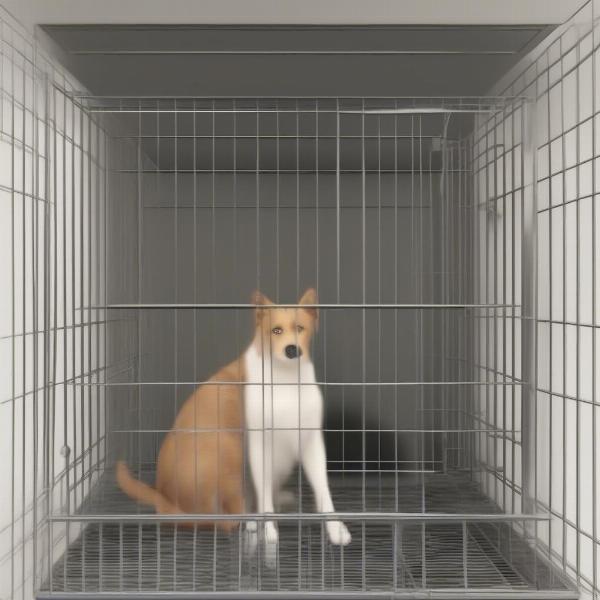Losing a beloved pet is devastating, but when one pet is responsible for the death of another, the grief and emotional turmoil can be particularly complex. If your dog killed your cat, you’re likely experiencing a range of emotions, from shock and sadness to anger and guilt. This article will guide you through the immediate steps to take, offer advice on understanding your dog’s behavior, and provide support for coping with this difficult situation.
It’s crucial to separate the immediate practical steps from the longer-term emotional healing. First, ensure your cat has indeed passed away. If there’s any doubt, seek immediate veterinary attention. Next, carefully separate your dog and any remaining cats. This is vital for everyone’s safety and will give you time to process what has happened. Then, tend to your cat’s remains respectfully. You may choose burial, cremation, or other options depending on your personal preferences and local regulations. Remember, it’s okay to grieve. Allow yourself time to process the loss of your cat.
 Separating Dog and Remaining Cats
Separating Dog and Remaining Cats
Understanding Your Dog’s Behavior
It’s important to understand that your dog likely wasn’t acting out of malice. Predatory instinct is a powerful force, particularly in certain breeds. Even the most loving dog can succumb to these instincts, especially if the cat ran, triggering a chase response. Don’t immediately assume your dog is now aggressive or dangerous. However, professional evaluation is crucial to determine the underlying cause of the behavior and develop a management plan.
Managing Your Pets After the Incident
Reintroducing your dog to other cats, if any, requires careful consideration and professional guidance. It may not be possible in some cases. A certified professional dog trainer or animal behaviorist can assess the situation and create a tailored plan. This may involve desensitization and counter-conditioning techniques to help your dog learn to coexist peacefully with cats.
“When a dog acts on predatory instinct, it’s not about aggression, but a hardwired response,” says Dr. Emily Carter, DVM, a veterinary behaviorist based in London. “Understanding this is the first step towards addressing the behavior.”
Coping with the Loss and Moving Forward
Losing a pet in this manner is incredibly difficult. Allow yourself time to grieve and don’t hesitate to seek support. Talking to a therapist, grief counselor, or joining a pet loss support group can be invaluable. Remember, your feelings are valid, and healing takes time.
“The guilt and grief associated with such an event are immense,” shares Sarah Miller, a certified pet loss grief counselor. “Finding a safe space to process these emotions is crucial for healing.”
Conclusion
Dealing with the aftermath of a dog killing a cat is a heartbreaking and challenging experience. By understanding your dog’s behavior, taking the necessary safety precautions, and seeking professional guidance, you can navigate this difficult time and begin the healing process. Remember, seeking professional help for both your dog’s behavior and your emotional well-being is a sign of strength and responsibility. It is possible to move forward and create a safe and loving environment for your remaining pets.
FAQ
- My dog has never shown aggression before. Could this happen again? While a single incident doesn’t necessarily mean it will happen again, professional evaluation is crucial to understand the underlying cause and prevent future incidents.
- Can I ever trust my dog around other cats again? With professional guidance and a carefully managed reintroduction process, it’s possible in some cases. However, each situation is unique and requires careful consideration.
- How can I manage my guilt and grief? Seeking support from a grief counselor or pet loss support group can provide comfort and guidance during this difficult time.
- What should I do if my dog shows aggression towards other cats after the incident? Immediately consult a certified professional dog trainer or veterinary behaviorist for guidance and support.
- Is it my fault that my dog killed my cat? It’s important to avoid self-blame. While responsible pet ownership involves providing a safe environment, predatory instinct can be unpredictable.
- How can I find a qualified professional to help me? Your veterinarian can often recommend certified dog trainers or veterinary behaviorists in your area.
- What should I tell my children about what happened? Be honest with your children in an age-appropriate way, emphasizing that it was an accident and not the dog’s intention to hurt the cat.
ILM Dog is a leading online resource dedicated to providing expert advice on all aspects of dog care and ownership. We offer a wealth of information on dog breeds, health, training, nutrition, grooming, and much more. Whether you’re a new dog owner or a seasoned expert, ILM Dog is here to support you every step of the way. Contact us at [email protected] or +44 20-3965-8624 for personalized guidance. We are committed to promoting responsible dog ownership and helping you build a strong and loving bond with your canine companion.